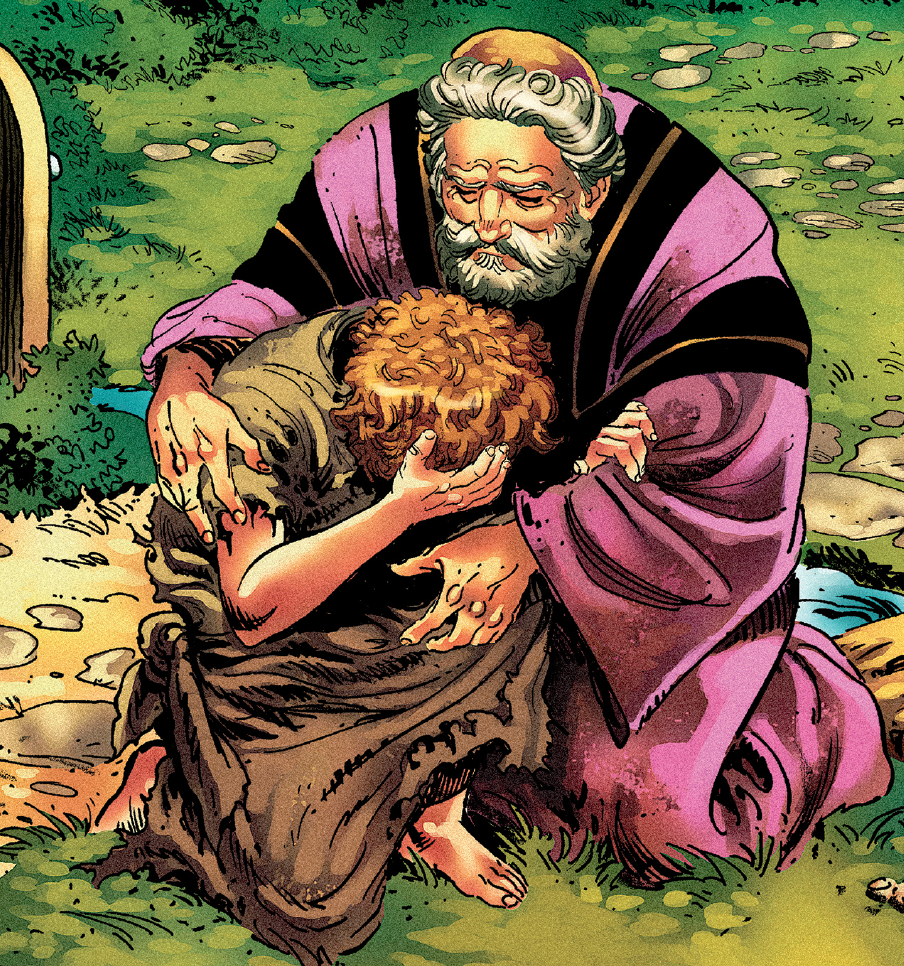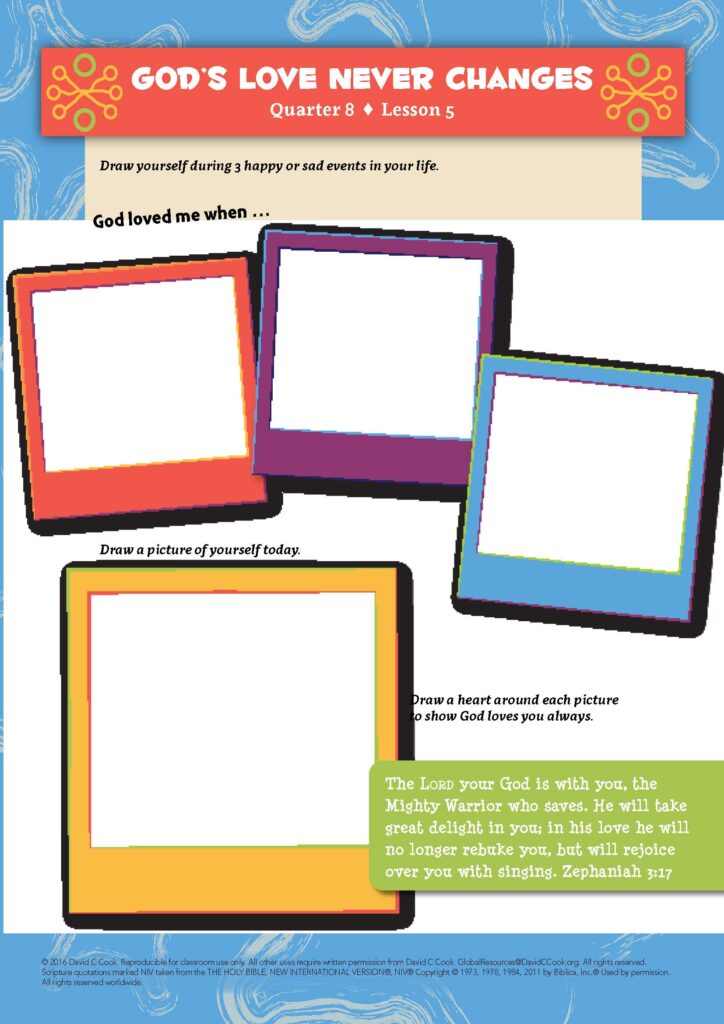During the lesson, the information for you to know is written in regular type, and what we suggest speaking or reading aloud to children is in bold. All resources for this lesson, including the Teacher Guide, Student Page, Family Connection Card, and other resources can be downloaded in a ZIP file by clicking on the following link:
In some lessons you will find "resource articles." These are articles written by experts from around the world to help equip you for your work with children and adolescents. Share them with parents or guardians if you consider it appropriate.
Before class, gather small prizes for the children, 1 for each child. Some ideas are flowers, small food treats, stickers, or handwritten notes.
The Lord is compassionate and gracious, slow to anger, abounding in love.
Psalm 103:8
God loves you because God is love. He does not love you because of what you have done or not done. He does not love you because of the work you do for Him. He does not love you because you live a moral, upright life. You cannot earn God’s love. You cannot lose God’s love. God loves you because of who He is! He loves you with a love that never stops, never gives up, and never changes—His love
is abounding!
Do you ever feel that you must try to earn God’s love? God’s love cannot be earned. It is yours to receive. He welcomes each of us with open arms just as the prodigal son’s father received him, even when he had chosen destructive ways. This week, start each day with a simple prayer: “God, thank You for loving me no matter what. I receive Your love today.”
Tell the families that this week their children will learn that Jesus loves them whether they choose to do good or wrong. Encourage families to talk about when someone gave them a gift they did not earn.
Teacher Tip: If possible, email or text the Family Connection Card to the families of your students.
Set the bottle or jar on the ground. Mark a spot about 2 meters from the bottle. Have the children line up behind the spot. Explain that the children will each take a turn trying to toss a stone into the bottle. Tell them that if everyone gets a stone into the bottle, they will all receive a prize.
Allow each child to try tossing a stone into the bottle. If some children become frustrated by how difficult the task is, encourage them to simply try their best. After the children have tried tossing the stones, ask them to sit down, and give each of them a prize.
Children may share that they were surprised, happy, excited, relieved, or other feelings.
Today we will learn a story that Jesus told. Someone in the story is given something very special even though he did not earn it.
During the time when Jesus lived on earth, tax collectors often cheated people out of their money. One day, some tax collectors and other sinners gathered around Jesus. The religious people did not like this. They did not think Jesus should spend time with such sinful people. So Jesus told several stories, or parables, to help the religious people understand that He loves every person, no matter what that person has done. This is one of the stories Jesus told.
Select 3 volunteers to act out the story as you tell it. Assign each one a role: the father, the older son, and the younger son. If appropriate in your community, some volunteers could act as the pigs. Explain that they should act out the story silently but with a lot of expression as you tell it.
Optional: If you are using The Action Bible, children can read this story before the actors act it out for them. It is found on pages 600–603. If possible, share the image from The Action Bible.

There was a man who had 2 sons. The younger son said to his father, “Father, give me my portion of your inheritance now.” So the father divided his money and everything he owned and distributed it between his sons.
Pause for the volunteers to silently act out the scene.
Soon after, the younger son took all of the money and things his father had given him and moved far away. There he lived a wild, undisciplined life and spent all of his money wastefully. After a time there was a famine in the land, and he had no money or food. So he got a job feeding pigs at a farm. The son was so hungry that he wanted to eat the pigs’ food, but no one offered him anything to eat.
Pause for the volunteers to silently act out the scene.
The son thought about his father’s house. “Even the servants in my father’s house have plenty to eat,” he thought. So he decided to return home and ask his father to let him be a servant.
Pause and ask the children:
The younger son wasted all the money his father had given him. How do you think the father will respond to the younger son?
Allow 2–3 children to share their ideas. Do not tell them what happens next.
Let’s read the next part of the story directly from the Bible.
Read Luke 15:20–24 from your Bible.
So [the younger son] got up and went to his father. But while he was still a long way off, his father saw him and was filled with compassion for him; he ran to his son, threw his arms around him and kissed him. The son said to him, “Father, I have sinned against heaven and against you. I am no longer worthy to be called your son.” But the father said to his servants, “Quick! Bring the best robe and put it on him. Put a ring on his finger and sandals on his feet. Bring the fattened calf and kill it. Let’s have a feast and celebrate. For this son of mine was dead and is alive again; he was lost and is found.” So they began to celebrate.
Luke 15:20–24
Have the children playing the younger son and father silently act out the scene. When they are finished, lead the class in clapping for the volunteers.
How did the father react when he saw his younger son?
The father was filled with compassion for his son. He ran to him and hugged and kissed him. He did this before the son apologized for what he had done!
The father loved his son. He loved him when he lived in his house and followed the rules. And he still loved him when he ran away, wasted his money, and made very bad decisions. The father may have been sad and disappointed when his son ran away, but he never stopped loving his son.
Father God is like the father in this story. He loves you always. He loves you no matter what you do. He loves you no matter what other people have done to you. He loves you no matter what other people think of you. God loves you when you feel unimportant and unloved. He loves you with a love that never stops and never gives up. His love for you never changes. God loves you always, no matter what!
God love you always, no matter what! That is why He sent His Son Jesus to forgive our sins. God’s love never changes! God’s love never stops!
Now you will use your imaginations as I tell you 3 stories. As you listen, remember that God is like the father in the story you just heard. After each story, share with your neighbour you what God might say to the child.
Pause after you read each of the mini-stories for the children to share their thoughts. Allow 1–2 to share with the class before you read the next story.
Just as the father in today’s story loved his son, God loves you. He loved you when you were a baby. He loves you today. And He will love you when you are grown. God loves you when you show kindness to others and make good choices. And He loves you when you sin and make bad choices. God loves you so much that He gave His Son to pay for your sins so that you can be part of His forever family.
Let’s think about God’s love for us during 3 different times in our lives.
Ask your children to think of 3 important events in their lives. They can be good or bad, but the children’s lives should be different because of them. Share these possible ideas: “I started school,’” My father got a good-paying job,” “My sister died.” Give them about 30 seconds to think.
Who wants to share a sentence about something from your life with the class?
Allow a few children to share. Some children will not want to share. That is okay.
I will say the words “God loved me when.” You will all finish the sentence at the same time by saying one of your important events. You can say your event out loud or silently to yourself. For example, when I say, “God loved me when,” you might say, “I was born!”
Say the words “God loved me when” 3 times. Pause each time for the children to respond.
The father in our story loved his son, even though he had experienced some bad things and had done some bad things. Some of the important events you just thought of may have been bad too. I want you to remember that no matter what you have experienced and no matter what you have done, God’s love for you never changes, never gives up, and never stops.
Think again about your important events. What does it mean to you to know that God’s love for you never changes, never gives up, and never stops, even in that situation?
Pause for the children to think
Now I will say, “God’s love” 3 times. After the first time, shout out, “Never changes!” After the second time, shout out, “Never gives up!” After the third time, shout out, “For me never stops!”
Say the words “God’s love” 3 times. Pause each time for the children to shout the rest of the sentence. Encourage the children to think about what the words mean as they shout them with great feeling. Repeat this.
Optional Supplies:
Give each child a piece of paper and a pencil or crayon. Have them divide their papers into 4 squares. In each of the first 3 squares, they will draw pictures of themselves at important times their lives. In the 4th square, they will draw a picture of themselves today. Then have them draw a heart around each picture. Explain that the hearts represents Jesus’ love for them during each event in the lives.
If you are using Student Pages, let the children do this activity on them now.
End of Option

God loves you with a love that never stops, never gives up, and never changes. God’s love for you will last forever! Listen for how God sings His love over you as I read Zephaniah 3:17 as a blessing.
End class by praying this blessing based on Zephaniah 3:17 over the children.
If you are using the Memory Verse Poster, show it to the students.
The Lord your God is with you, the Mighty Warrior who saves. He will take great delight in you; in his love he will no longer rebuke you, but will rejoice over you with singing.
Zephaniah 3:17

Blessing: May you know that the Lord your God is with you. He is mighty to save. He takes great delight in you. He will quiet you with His love. He rejoices over you with singing.
Lead the children in singing this quarter’s song, if possible.
Life on Life ©2020 David C Cook. Reproducible for home or classroom use only. All other uses require written permission from David C Cook [email protected]. All rights reserved.